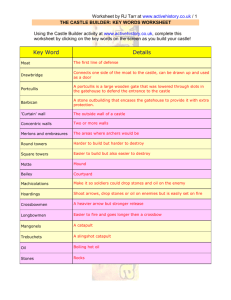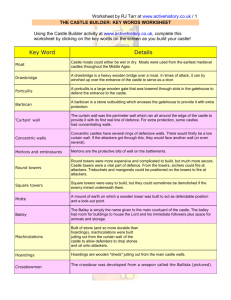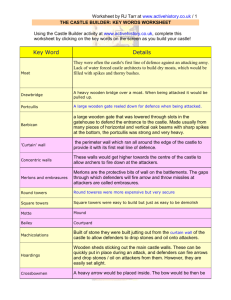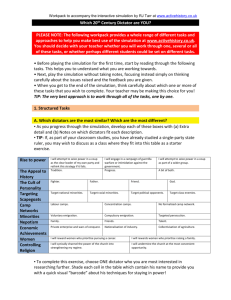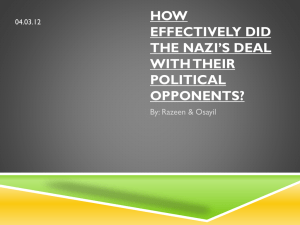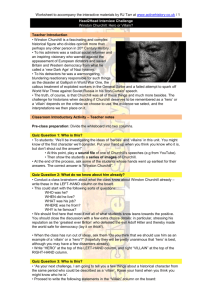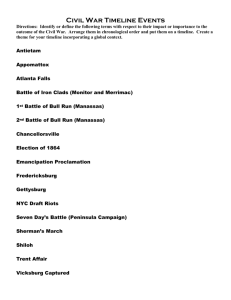Step 3: The Big Picture: Fresh Events and Individuals
advertisement
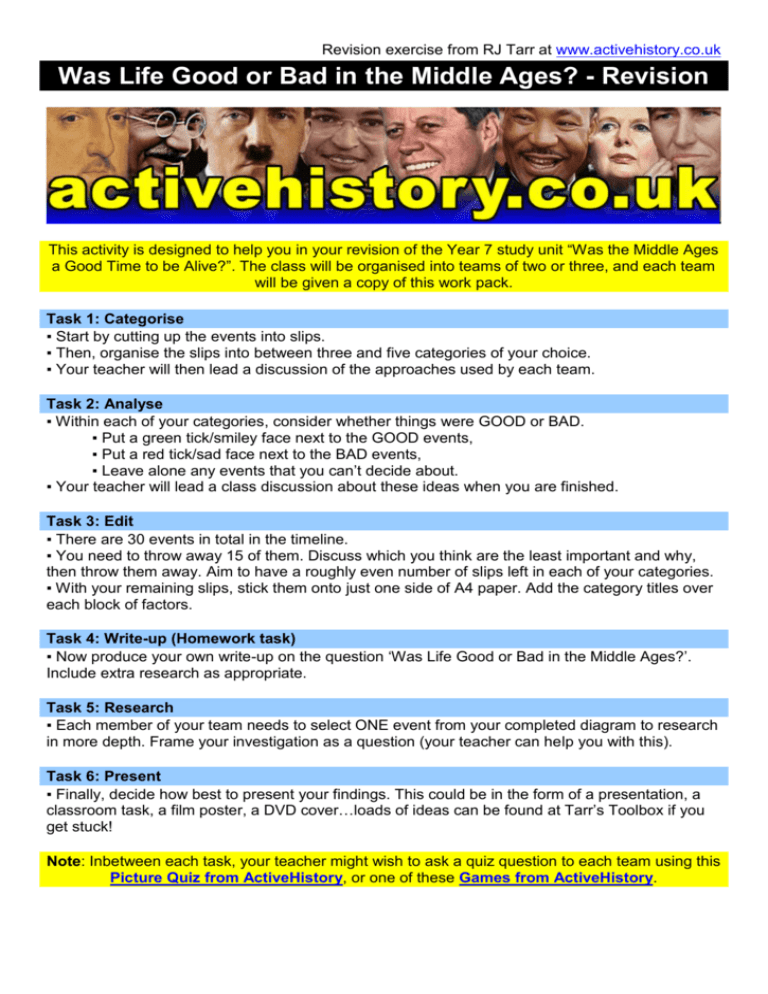
Revision exercise from RJ Tarr at www.activehistory.co.uk
Was Life Good or Bad in the Middle Ages? - Revision
This activity is designed to help you in your revision of the Year 7 study unit “Was the Middle Ages
a Good Time to be Alive?”. The class will be organised into teams of two or three, and each team
will be given a copy of this work pack.
Task 1: Categorise
▪ Start by cutting up the events into slips.
▪ Then, organise the slips into between three and five categories of your choice.
▪ Your teacher will then lead a discussion of the approaches used by each team.
Task 2: Analyse
▪ Within each of your categories, consider whether things were GOOD or BAD.
▪ Put a green tick/smiley face next to the GOOD events,
▪ Put a red tick/sad face next to the BAD events,
▪ Leave alone any events that you can’t decide about.
▪ Your teacher will lead a class discussion about these ideas when you are finished.
Task 3: Edit
▪ There are 30 events in total in the timeline.
▪ You need to throw away 15 of them. Discuss which you think are the least important and why,
then throw them away. Aim to have a roughly even number of slips left in each of your categories.
▪ With your remaining slips, stick them onto just one side of A4 paper. Add the category titles over
each block of factors.
Task 4: Write-up (Homework task)
▪ Now produce your own write-up on the question ‘Was Life Good or Bad in the Middle Ages?’.
Include extra research as appropriate.
Task 5: Research
▪ Each member of your team needs to select ONE event from your completed diagram to research
in more depth. Frame your investigation as a question (your teacher can help you with this).
Task 6: Present
▪ Finally, decide how best to present your findings. This could be in the form of a presentation, a
classroom task, a film poster, a DVD cover…loads of ideas can be found at Tarr’s Toolbox if you
get stuck!
Note: Inbetween each task, your teacher might wish to ask a quiz question to each team using this
Picture Quiz from ActiveHistory, or one of these Games from ActiveHistory.
Revision exercise from RJ Tarr at www.activehistory.co.uk
1066: William 'The Conqueror' crowned King of
England after defeating the Saxons at the
Battle of Hastings.
1296: Edward I of England defeats the Scots at
Dunbar. The resistance fighter William Wallace
('Braveheart') is later captured and executed.
www.activehistory.co.uk
www.activehistory.co.uk
1069: Harrying of the North: William destroys
homes, crops and livestock in the north of
England after a major rebellion. Thousands die.
1314: Robert the Bruce leads the Scots to
victory against the English at Bannockburn;
English forces withdraw from Scotland.
www.activehistory.co.uk
www.activehistory.co.uk
1070: Hereward the Wake leads a Saxon
rebellion against William the Conqueror. He is
defeated after a long battle.
1337: Hundred Years War begins. England
wins victories against France at Crecy, Poitiers
and Agincourt under Edward (the 'Black
Prince') and King Henry V.
www.activehistory.co.uk
www.activehistory.co.uk
1077: The Tower of London is built by William
the Conqueror with stone imported from
France. It is a palace at first, but later becomes
a prison.
1347: Black Death spreads across Europe; 1/3
of population die but those who survive get
more land, resources and wages.
www.activehistory.co.uk
www.activehistory.co.uk
1086: Domesday Book is written for William the
Conqueror so he can decide how much tax
should be paid by each English town.
1378: The 'Great Schism': the Christian Church
splits into two as three rival popes are declared
in different parts of Europe!
www.activehistory.co.uk
www.activehistory.co.uk
1099: Christians seize the city of Jerusalem
from the Muslims but many men are killed in
the battle.
1380: The 'Canterbury Tales' is written by
Geoffrey Chaucer – a great work of English
literature which makes fun of greedy priests
(and others!)
www.activehistory.co.uk
www.activehistory.co.uk
1166: King Henry II introduces trials by jury (a
vote of 12 men) to replace 'trial by battle' and
'ordeal by fire'.
www.activehistory.co.uk
1381: The Peasants’ Revolt – Wat Tyler and
John Ball lead a demonstration against low
wages. Tyler is killed during a meeting with the
King.
www.activehistory.co.uk
1170: Thomas Becket is murdered by nobles
loyal to King Henry II of England. Becket is
made a saint and the King is publicly whipped
as punishment!
1381: John Wycliffe translates the Bible into
English for the first time. Ordinary people can
now read it for themselves, which the Pope
finds dangerous.
www.activehistory.co.uk
www.activehistory.co.uk
Revision exercise from RJ Tarr at www.activehistory.co.uk
1187: Muslim leader Saladin captures
Jerusalem from the Christians and throws them
out of the Holy City.
1415: Battle of Agincourt: King Henry V wins a
stunning victory over the French during the '100
Years War'
www.activehistory.co.uk
www.activehistory.co.uk
1192: King Richard 'the Lionheart' persuades
the Muslin leader Saladin to let Christians visit
Jerusalem on pilgrimages.
1430: Joan of Arc executed: The English burn a
young Frenchwoman to death for inspiring the
French with speeches during the 'Hundred
Years War'
www.activehistory.co.uk
www.activehistory.co.uk
1208: The 'Albigensian Crusade' crushes the
Cathars – a group of Christians based in the
south of France who tried to break away from
the Catholic Church.
1454: Gutenberg invents the first printing press
– the internet of the Middle Ages! New ideas
spread all over Europe – some peaceful, some
aggressive.
www.activehistory.co.uk
www.activehistory.co.uk
1212: The 'Children’s Crusade' starts in
Germany. Thousands of youngsters march to
the Holy Land, never to return – they die in
battle or become slaves.
1455: Wars of the Roses begin in England
when two families each claim the throne. The
Battle of Barnet remains the bloodiest battle
ever fought on English soil.
www.activehistory.co.uk
www.activehistory.co.uk
1215: The Magna Carta is signed by King John
under pressure from his nobles, giving basic
rights to English people. He loses the crown
jewels in the sea.
1485: End of Wars of Roses – Henry Tudor kills
King Richard III at the Battle of Bosworth and
seizes the English throne after finding the
crown in a bush.
www.activehistory.co.uk
www.activehistory.co.uk
1231: The Inquisition is established by the
Church to stamp out non-Christian religions
throughout Europe.
1492: Spain finishes throwing out all Africans
and Jews and declares itself to be a thoroughly
Christian Country.
www.activehistory.co.uk
www.activehistory.co.uk
1291: Acre, the last Christian city in the Near
East, is captured by the Muslims. This brings
the fight between Muslims and Christians ('The
Crusades') to an end.
1492: Columbus discovers America for Spain’s
rulers, Ferdinand and Isabella. Gold is seized
from the Aztec and Inca tribes and floods into
Europe.
www.activehistory.co.uk
www.activehistory.co.uk
